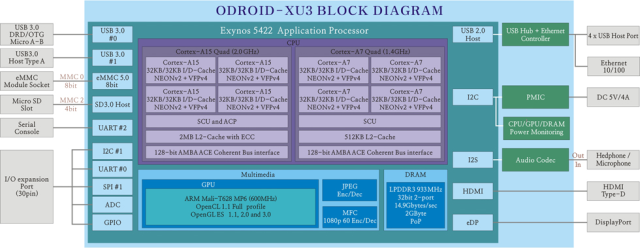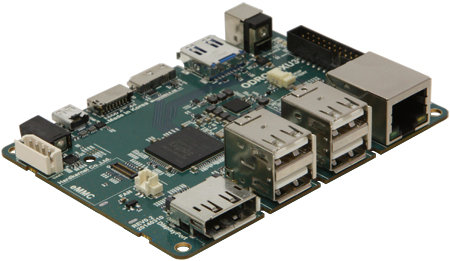Remember ODROID-XU2 development board based on Exynos 5420? The bad news is that it apparently got scrapped, but the good news is that it gave birth to ODROID-XU3 development board powered by the latest Samsung Exynos 5422 octa core big.LITTLE SoC with support for Ubuntu 14.04 and Android 4.4, including GPU 3D acceleration with the company promising a full desktop experience in Ubuntu.
- SoC – Samsung Exynos 5422 quad core ARM Cortex-A15 @ 2.0GHz+ quad core ARM Cortex-A7 @ 1.4GHz with Mali-T628 MP6 GPU supporting OpenGL ES 3.0 / 2.0 / 1.1 and OpenCL 1.1 Full profile
- System Memory – 2GB LPDDR3 RAM PoP (933Mhz, 14.9GB/s memory bandwidth, 2x32bit bus)
- Storage – Micro SD slot (up to 64GB) + eMMC 5.0 module socket (16, 32, or 64GB module available)
- Video Output – micro HDMI (Up to 1080p) and DisplayPort (up to 2160p)
- Audio Output – micro HDMI and 3.5mm headphone jack
- Network Connectivity – 10/100Mbps Ethernet (Via LAN95144 USB + Ethernet controller)
- USB – 1x USB 3.0 host port, 1x USB 3.0 micro USB OTG port, 4x USB 2.0 ports
- Expansion – 30-pin header for access to GPIO, IRQ, SPI and ADC signals
- Debugging – Serial console header
- Misc – Accurate current sensors and voltage sensors for energy measurement, Power and RGB LEDs, cooling fan header
- Power Supply – 5V/4A power adapter using 5.5/2.1mm barrel.
- Dimensions – PCBA: 94x70x18mm; Enclosure: 98x74x29mm

The company can also provide USB modules / dongles for optical S/PDIF output, Gigabit Ethernet (USB 3.0 to Ethernet adapter), Wi-Fi 802.11n/g/n 1T1R with antenna, and 2.5″/3.5″ SATA drives (USB 3.0 to SATA III adapter). Hardkernel will provide Ubuntu 14.04 support with OpenGL ES + OpenCL support, and Android 4.4.2 both based on Linux kernel 3.10 LTS, and the source code will soon be available on their github account. This is also the first ODROID board that supports Heterogeneous Multi-Processing / Global Task Scheduling implementation of big.LITTLE processing. You can get an overview of the board and see Ubuntu 14.04 running OpenGL ES 3.0 demo, and playing a windowed YouTube video – which makes me think hardware video decoding may not be implemented yet – in the video below.
ODROID-XU3 comes with a plastic case, an active cooler and a 5V/4A power adapter, and you get pre-order it for $179 + shipping on Hardkernel website with delivery schedule for the 18th of August 2014. There’s no internal storage with the board so you’ll need a micro SD card (Class 10 strongly recommended), or even better purchased one of the eMMC module with the board. The 16GB eMMC sells for $39 and includes an adapter to connect it to your PC. You can get more information, and/or purchase the board and a few of its 23 accessories on Hardkernel’s ODROID-XU3 product page.

Jean-Luc started CNX Software in 2010 as a part-time endeavor, before quitting his job as a software engineering manager, and starting to write daily news, and reviews full time later in 2011.
Support CNX Software! Donate via cryptocurrencies, become a Patron on Patreon, or purchase goods on Amazon or Aliexpress






I definitely love these boards for ARMv7. I used them for RPMs cooking. Hardkernel never wanted to have mainline support, thankfully, Samsung recently decided to add support for ODROID boards with Exynos4. If Samsung does the same things for Exynos5 based ODROID machines it will be amazing ARMv7 board.
They also never managed to deliver OpenCL support for Linux. This is Mali, thus ARM Mali SDK should be enough to run OpenCL?
Still waiting for affordable aarch64 (ARMv8), probably the next board.
@davidlt
They claim OpenCL support, so I’d assume it’s also supported.
ARMv8 low cost development boards will probably be a 2015 story.
Hardkernel is a small hardware company, and they are doing their best to deliver high quality and affordable boards to the hobbyist hackers. It’s up to Samsung to mainline the support for their Exynos4 SoC in the first place. The hobbyist hackers can also take part in this process if they wish and find it enjoyable.
Would you prefer Hardkernel to hire a team of skilled linux kernel developers, and let them do the Samsung’s homework? If yes, would you be happy with a hefty odroid boards price tag increase to pay the salaries of these linux kernel developers?
HDMI and DisplayPort can both be used as the same time for a dual display configuration under Ubuntu -> https://plus.google.com/u/0/110182859065238412238/posts/BVVeYdzz224?pid=6033623489614421970&oid=110182859065238412238
@ssvb
I am not talking about Exynos4/5 SOC support in mainline. Samsung is currently doing a great job, they now even support multi-platform kernel. They are also refactoring some ARMv7 parts, so that you could use common parts on ARMv8.
I am talking about the board support. I love hardkernel, but they not putting effort into adding their board to mainline kernel is not a benefit. So far all code/DTS pieces for ODROID boards have only Samsung emails. Samsung is now pushing to have a better support for Exynos4 based ODROID boards.
@davidlt
Yeah, Samsung is doing a great job fooling around with the mainline kernel at least since 2011 (as part of their Linaro membership). That’s when I got my first Exynos based board, so I think that I have a bit of first hand experience – http://ssvb.github.io/2011/07/30/origenboard-early-adopter.html 🙂
However the tricky part is that Samsung is still not using the mainline multi-platform kernels for their popular high end Android phones, and I don’t see the DTS pieces for these phones yet. Not too much of their own dog food eating yet?
My understanding is that Hardkernel guys are getting the same SDK code dumps as are used in production for the Samsung Android phones. So why is the small company without much software competence in house at fault now and supposed to do a better job than a filthy-rich mega-corporation? As I see it, Samsung is just using ODROID as a guinea pig for the mainline kernel deployment experiments. It is a good thing, but I can hardly see them being really altruistic. More like they are avoiding risks and don’t want to screw up their real products yet.
@ssvb
What they have in smartphones and what’s in mainline kernel is different. What’s in the smartphones are more like nasty hacks, which would never get ACK to enter the mainline. I think Samsung/Linaro slowly is refactoring the code to use as much common code as possible. In smartphones Samsung cares about time-to-market, not about code quality (probably).
It’s actually interesting if GTS support is using MP patches from Linaro, or home-cooked implementation. So far, I thought, there was only one development board with GTS support made by ARM Ltd. And GTS implementation, I think, is not yet in mainline kernel (but IKS should be). In the end there are too many mailing-lists and repositories to follow everything.
@davidlt
IMHO, if Samsung is allowed to care about the time to market, then so is Hardkernel. Stating otherwise is a bit hypocritical.
Hardkernel just provides the hardware, which is validated using these “nasty hacks, which would never get ACK to enter the mainline” to save time and reduce expenses. Then anyone can buy these boards at an affordable price and hack the mainline kernel to his heart’s content.
I think this board is expensive.
Go add up the costs of this and you will be at $300.
Before you say, “But Big Baby Jesus you don’t have to orde…”
Save your breath for running that marathon in your sketchy short man shorts that no man should ever wear…
You are buying this item and not using anything that it offers then.
Sure you might have an extra charger from your Galaxy S3.
Sure you might get the 8gb eMMC instead of the 16gb eMMC.
In the end you’re still going to be paying over $270.
The $40 s&h is total garbage.
I feel like this item compares to the following:
You can buy the EconoCar affordable car for only $250 bucks….it’s the best deal out there right now!!!!
DISCLAIMER:
The EconoCar doesn’t come with:
Wheels, rims, doors, seats or a steering wheel.
You can purchase those items for an extra $5,000.
Add the shipping at $40 with the other needed items to run this thing and it adds an extra $100 to the cost.